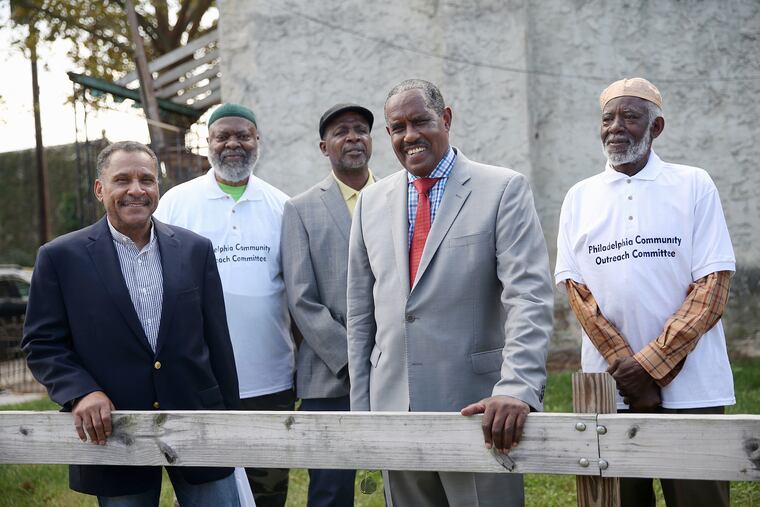If there’s something wrong in your West Philly neighborhood, who you gonna call? These guys. | Helen Ubiñas
Tired of seeing their neighbors surrender to crime and blight, a group of men stepped up.

These guys need a catchy name. And maybe some capes.
Though when I half-jokingly suggest that the group’s bold approach to cleaning up West Philadelphia neighborhoods calls for a superhero makeover, they wave me off.
Fine. But as practical as they are, the shirts emblazoned with “Philadelphia Community Outreach Committee” don’t do justice to their approach:
Bullhorns aimed at open-air drug salesmen.
Streets swept clean.
Fences erected around empty lots co-opted by drug dealers.
Trees trimmed that once offered cover to illegal activities.
And this is where their superpowers really kick in: enlisting police, elected officials, and neighbors to not just help, but to collaborate and take the lead once they move on.
That’s not always as simple as it sounds, Pete Wilson, cofounder of the group and Democratic leader of the Sixth Ward, told me. Not when elderly residents don’t feel safe to sit on their porches, and when parents won’t allow children to play outside, and when, let’s be honest, too many in the city still resign themselves to the status quo I long ago coined as the dreaded Philly Shrug.
“The people in a lot of our communities don’t feel their own power,” said Ishaq Samai, 70, the other half of the founding team.
“For decades, they have shielded themselves from the reality that they are watching the erosion of their own neighborhoods.”
About five years ago, that’s what prompted Samai, an intake and resource coordinator for the city’s Office of Reentry Partnerships (RISE), to call on his friend Wilson and other men from local mosques they attend.
It wasn’t a hard sell.
“I got tired of seeing it; years of the same thing: blight, crime, just people not caring,” said Wilson, 68. “We wanted to wake them up, activate them by telling them, ‘Take care your own spot. And we’ll come out here from other neighborhoods and stand with you to cool this out,’ and that’s what we did.”
Seeing is believing. So, I recently met the guys at 43rd and Pennsgrove Streets, the site of their first cleanup a few years ago. Besides Samai and Wilson, the core group includes Islam Sharief, 68, who runs a nonprofit anti-violence program, Abdul Malik Ibrahim, a retired postal worker, and Khabir Rashid, 73, a retired painter.
I was early, and for a minute, I thought, in the wrong place. The guys had insisted their cleanup was a success, but the only sounds I heard were birds chirping and neighbor Joseph Johnson’s broom brushing against the pavement as he tidied up an already clean street.
I should have seen what it was like before, the guys said. Until they came in, a nearby house was ground zero for everything that kept residents trapped in their own homes. There are pictures of them squeezed into living rooms, as they sought buy-in from neighbors who weren’t always easy to convince. They pointed to surveillance cameras, an initiative with Philly police to keep an eye on the neighborhood that has since organized to keep the progress going.
As they reminisced, a man called out Wilson’s name. Rich Frazier said he lives nearby. What did he think about the guys’ efforts? He said: “Look around.”
But anecdotal evidence isn’t enough for the group’s members, especially Samai, who pointed to police stats to show their efforts are working. Since their cleanups on a handful of streets, including 43rd and Pennsgrove, data from the 16th Police District showed a decrease in arrests for multiple crimes, including shootings and narcotics. The group now has set their sights on a section of the commercial corridor near 41st and Lancaster.
Days after we met at 43rd and Pennsgrove, Kathy Jordan, president of Community Leaders Collaborative, was manning a table on Lancaster Avenue full of pamphlets about neighborhood programs. Behind her, Samai, surrounded by representatives from multiple community organizations, shouted into a bullhorn: “We are going to have a clean community — and that’s the bottom line!”
The improvement is undeniable, Jordan said. She credited multiple groups working as a collaborative that has continued to grow as they target one block after another.
Of course, there’s always the danger of an area reverting to its old ways, and it happens. But now when neighbors sense trouble, they don’t go into their homes and draw the shades. Empowered, they put in the work themselves. And if they need backup, they know they can always call on the guys.
At that, I perked up. So, kind of like a bat signal?
Sure, they relented, laughing, kind of like a bat signal.